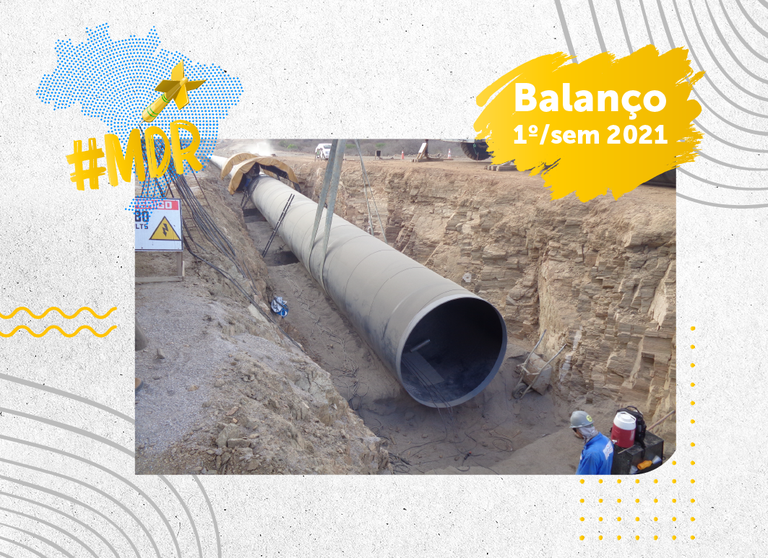INFRASTRUCTURE
The Federal Government, through the Ministry of Regional Development (MDR), started 2021, giving strong impetus to the continuity of basic sanitation works. Actions for water supply, sanitary sewage, urban solid waste management and rainwater drainage are contemplated. In the first six months of this year alone, Pasta directly invested R$ 940.8 million in sector enterprises across the country.
The MDR is the body responsible for implementing and guiding public policy guidelines for the sanitation sector. The work done to ensure that resources reach states, municipalities and the Federal District is part of the federal effort to enable the goals of universalization of water supply and sanitary sewage services to be met by 2033, a deadline stipulated with the sanction of the new Framework Sanitation Law, in July 2020. The text provides that 99% of Brazilians must have access to treated water and 90%, the collection and treatment of domestic sewage in the next 12 years.
“We continue with the commitment signed by President Jair Bolsonaro not to stop the construction work. This volume of investments in the first half of 2021 made by the Federal Government demonstrates this. In addition, it also reinforces the importance of the basic sanitation sector for the country's development, because it will bring better health and better quality of life to millions of Brazilians throughout our territory”, highlights the Minister of Regional Development, Rogério Marinho.
Of the R$ 940.8 million invested in the sector, R$ 243.9 million correspond to transfers made through resources from the General Budget of the Union (OGU). A little more than half of this amount was allocated to states in the Northeast Region – R$ 124.7 million. The units that make up the South Region received R$ 43.4 million and those in the Southeast, R$ 42.6 million. In turn, the states in the Midwest region had access to R$ 22.6 million and those in the North, to R$ 9.4 million.
In addition to the amounts allocated directly from the federal budget, the MDR also authorized 10 states to contract up to R$802.5 million in financing for the implementation of basic sanitation works. The resources come from the Employment Compensation Fund (FGTS) and could be accessed through the Advance Cities – Sanitation Program.
The initiative coordinated by the Ministry of Regional Development aims to promote the improvement of basic sanitation in the country. The program is implemented through a public selection process for projects subject to financing with public banks.
Incentivized debentures
Another way to support the expansion and improvement of basic sanitation services is through the authorization to raise private funds for works through the issuance of incentivized debentures. This modality is private fixed income bonds that allow companies to borrow money from investors to finance projects in the infrastructure area with exemption or reduction of Income Tax on profits obtained by investors.
Of the total portfolio, started in 2015, nine projects were approved in 2021, with potential to raise up to R$ 1.3 billion in the capital market, which demonstrates the growth of this instrument to make sanitation works feasible in the country.
There is also the modality of incentive debentures aimed at the management of urban solid waste. In June this year, the MDR approved a company in Rio de Janeiro to raise up to R$ 450 million on the market for the expansion of the Rio Waste Treatment Center (CTR Rio), located in the city of Seropédica, in the Baixada Fluminense (RJ) .
The funds will be used to expand the landfill and implement a new leachate treatment plant and an energy generation unit with a capacity of 2.8 MW. In addition to Seropédica, the cities of Barra do Piraí, Itaguaí, Mangaratiba, Miguel Pereira, São João do Meriti and Rio de Janeiro will benefit from the expansion of CTR Rio.
Auctions
A central part of the strategy for the integral implementation of the premises introduced by the new Sanitation Legal Framework is the support for holding auctions for the concession or formation of public-private partnerships (PPPs) for sanitation services. Since the enactment of the legislation, qu
.

 Mr. Alessandro Jacob speaking about Brazilian Law on "International Bar Association" conference
Mr. Alessandro Jacob speaking about Brazilian Law on "International Bar Association" conference